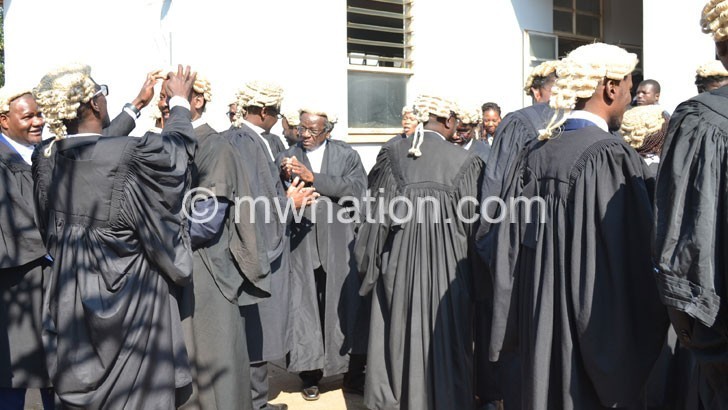Friends of court differ on proof
Two friends of the court, Malawi Law Society (MLS) and Women Lawyers Association (WLA), have made their final submissions in the presidential elections nullification petition case, slightly differing on aspects such as who shoulders the burden of proof.
While agreeing that the burden of proof rests with the petitioners, WLA differs with MLS as it submits that once a prima facie case is proven, the burden of proof shifts to Malawi Electoral Commission (MEC), the second respondent in the matter.
In its submission on burden of proof, MLS submits: “The burden of proof lies on the party who substantially asserts the affirmative of an issue. In this case, petitioners bear the burden of proving the irregularities and other matters they have alleged.”

But WLA has given a contrasting view on the burden of proof, stating: “We submit before the court that the burden of proving the complaints in the petitions is that of the petitioners. The petitioners must adduce adequate evidence to prove that there was an undue return of the election results as announced on May 27 2019.
“[But] once a prima facie case is proved, then the respondents [MEC], as a regulator, has an obligation to adduce evidence to the contrary failure of which the claims in the petition will have been successfully proved.”
MLS says that the case being a civil matter, the standard of proof is on a balance of probabilities.
The two parties’ submissions followed those presented by UTM Party president Saulos Chilima (first petitioner), Malawi Congress Party (MCP) president Lazarus Chakwera (second petitioner), President Peter Mutharika of Democratic Progressive Party (DPP) as the first respondent and MEC.
In the case being heard by the High Court of Malawi sitting as the Constitutional Court, the petitioners want the court to nullify the presidential election results in the May 21 Tripartite Elections over alleged irregularities, especially in the results management system.
In its 20-page submission to the court, MLS has isolated 10 key legal areas on which the court should base its ruling.
MLS has highlighted to the court what the law states on various issues under contest while attempting to desist from giving its opinion on the matter.
The areas include constitutional provisions directly relevant to elections and determination of its reference, provisions of the Presidential and Parliamentary Elections Act (PPEA) directly relevant to the elections and determination of petitions, burden of proof, standard of proof, admissibility of hearsay evidence, effect of admissions by any party and effect of bringing forth relevant witnesses.
The law society also highlights effects of not providing documents which were requested for and ordered to be produced; expert witness-opinions and findings and finally materiality of proved irregularities as other areas of focus.
The submission, prepared by private practice lawyer Powell Mkutabasa and MLS lead counsel in the matter Alick Msowoya, was yesterday served on all parties to the case ahead of the resumption of hearing of the case today for a two-day session of oral submissions.
“They have sat so much on the fence that you would think that there is no value they have brought to the case,” a lawyer speaking on condition of anonymity reacted to The Nation yesterday.
The hearing is a historic case for the country with no previous presidential elections referral reaching this stage.
President Peter Mutharika of Democratic Progressive Party (DPP), by virtue of being the declared winner of the presidential race, is the first respondent. The five High Court judges hearing the case are Healey Potani, Ivy Kamanga, Dingiswayo Madise, Redson Kapindu and Mike Tembo.





